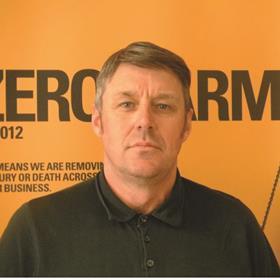Building has been searching for three 2012 Heroes who made a real difference to Olympics project. Find out why nominee Steve Wood made the shortlist
Over the last three months, Building has been searching for three Building 2012 Heroes. They can be people of all ages, job titles and professions within construction who have made a real difference on the Olympic project behind the scenes and have not been dominating the headlines - until now.
Calling on industry, the Olympic Delivery Authority (ODA) and our campaign partner CITB Construction Skills, Building has been pulling together a shortlist of people whose outstanding contribution to the construction of the venues has helped to make the Games such a success. And we’re not stopping yet.
It’s not too late to put yourself forward, or someone you think should be nominated. We will be accepting nominations until 6 July. Simply fill in the form here.
This week we’ll be talking to some of the nominees ahead of Friday’s feature on the campaign. Today we hear from Steve Wood, a true Olympic hero
STEVE WOOD
The 51-year-old works manager for Balfour Beatty on the aquatics centre from June 2008 to July 2011

Wood was the man on site responsible for coordinating an average of 800 workers at a time - a number that rose to 1,000 for two weeks at peak building period - safely and efficiently to deliver one of the Olympic park’s most iconic and technically complex schemes on time. Wood is now works manager on the Blackfriars station and bridge contract and will return to the aquatics centre post-Games to coordinate the removal of the temporary stands. He has been nominated as a Building 2012 Hero by Stuart Fraser who was project manager on the scheme.
Fraser said: “I’ve nominated Steve Wood as he was pivotal to the success of the aquatics centre. He was the focal point for all the logistics and labour management and central to the organisation of visits from Prince Philip to the Cabinet. Nothing was too much effort and he stoically supported the senior management team across all works for the duration of the scheme.”
In his own words
“When I was put forward for the aquatics centre job I didn’t quite realise the scale of it. We arrived on site which, at the time, was a couple of huts in a field. And Stuart [Fraser] said ‘the chances of working on an Olympic project in your lifetime are very slim. Let along one in your own country.’ And from that moment I appreciated how important this scheme was and I loved going into work every day for three years.
“It was a tough job to coordinate. We had a canal on one side and a railway on the other and this was no normal project. With a traditional building, you don’t put the roof on first like we had to so we had a team excavating under the roof, working inside out. This made actually getting to the centre of the building harder and harder so, in the end, we had to put a tower crane in the swimming pool which had never been done before.
“The coordination was key. I had people working on the underside of the roof on scaffolding 30 metres up at the same time I had another team tiling the pool. There were any number of different disciplines going on at one time in the venue, often layered at varying heights. It was my job to ensure everyone was working on the right thing, at the right time, safely.
“It was the job of a lifetime and I have missed it ever since I left. Now, on the Blackfriars project, people say to me ‘please don’t mention the aquatics centre again’ because I talk about it all the time. But this was a special job. I put everything into it.
“Next for me after Blackfriars is to go back to the aquatics centre post-Olympics to take the stands down and sort out the glazing. This will show the structure in its full glory and I can’t wait to help be a part of that after being so involved in getting the venue ready for Games.”



























No comments yet